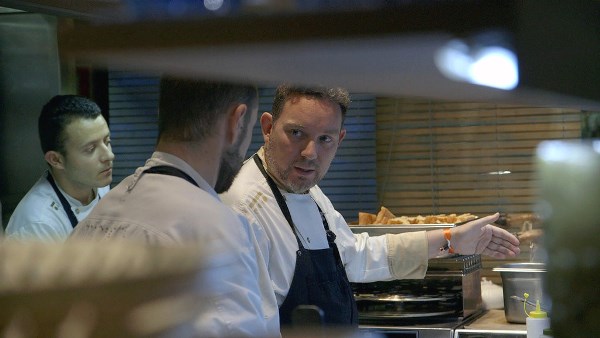This strangely muted documentary about one man’s quest for artistic independence tries very hard to serve up its main subject as appetizingly as possible: Albert Adrià, the one-time pastry chef at elBulli, which was considered among the world’s best restaurants prior to closing in 2011. When the film picks up in May 2013, Adrià is beginning work on the space for his latest Barcelona eatery. Never short of ambitious, he plans to open no less than five new restaurants within a one-year period, each specializing in a different type and style of cuisine.
Directors Laura Collado and Jim Loomis take a mostly reverent approach to their subject, framing him as less a businessman than a gastronomical maestro. His mastery of presentation is constantly on display, and during the few instances in which viewers get an explanation of what one of these masterworks consists of, we see how well-thought-out and inspired they often are. And like a great master, Adrià strives to push the proverbial envelope of his medium, even if he also proves a complicated person whose motivations and temperament are not always consistent.
His latest endeavor involves opening 41º, which specializes in food and cocktails prepared in ways that emphasize strong visuals, at roughly the same time as Tickets, an eccentric tapas bar. This would be a difficult enough feat, but complicating matters is Ferran, his brother and business partner as well as a constant critic of Adrià’s unconventional ideas. It’s slightly unclear whether Ferran completely supports his brother or is trying to undermine him. Maybe it’s both. During one interview, Ferran, who had been head chef at elBulli, claims Albert has the potential to surpass him. However, he adds that there can never be another elBulli.
For his part, Adrià seems supremely confident in his own vision—until he isn’t. Indeed, the very first scene involves his setting foot in what will become elBarri, which will serve Mexican comfort food, and after giving it a once-over, his opinion is to not change a thing. Then the film jumps ahead in time, wherein it’s clear he changed his mind as walls are being ripped open. Such alterations of plan happen more than once, leaving viewers to wonder whether Adrià is merely fickle, or if other principals, such as Ferran, have forced him to make compromises. If the former, it supports the image of Adrià as being individualistic, of wanting to forge his own path outside of elBulli’s lengthy shadow, but how can he do that with Ferran constantly at his ear?
The film proves a character study of someone who previously climbed to the pinnacle of his profession and now faces the challenge of recapturing that glory and exceeding it. His two new restaurants do well at first, each receiving a Michelin star, but that doesn’t seem to make Adrià happy. (After all, elBulli received three.) He constantly tinkers: opening eateries, closing others, and building new dishes in his laboratory. As restaurateurs go, what makes Adrià unconventional—or so the film seems to argue—is that he’s willing to shut down a critically successful business in order to make way for something even more audacious.
Collado and Loomis get a backstage look at the restaurants, which leads to some lively moments among staff members, who occasionally engage in antics such as gossiping about customers. Yet these scenes might have been more compelling if we got to know any of these ancillary figures; they aren’t named. Ultimately, Constructing Albert is the title subject’s show, and while he’s clearly an innovator, he doesn’t exactly inspire as a leader. He’s too dictatorial and mercurial, and as things become more stressful leading up to the opening of most elaborate venture yet, he becomes prone to angry outbursts.
Interestingly, this might be the first food-related documentary that left me without feeling any kind of craving. The visuals for Adrià’s creations are undoubtedly magical, as we can see the attention paid to color and form—such as a deconstructed bon-bon in which the flavors of individual components are separated out. But there’s not much attention paid to the joy that comes from eating something truly divine. Most of those partaking are Adrià and his kitchen staff, and their reactions are more often like intense contemplation.
elBulli was often associated with the food subgenre of molecular gastronomy, a term that gets bandied about, though no one goes through the trouble of defining it. The directors assume viewers will already know what it is. Yet the emotional disconnect between the subjects and the dishes they create remains problematic. Perhaps next time Adrià should try a food that appeals to mankind’s more primal side, such as, say, an old-fashioned steakhouse.

















Leave A Comment